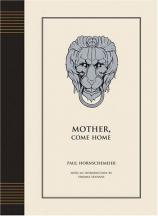Mother, Come Home
Review
Mother, Come Home
I’m a fan of Paul Hornschemeier’s visual versatility. While it heavily references all of the demigods of the indie comics scene—Charles Burns, Chris Ware, Daniel Clowes, and many of the other creators who are the defining voices of the genre—his style acts like a chameleon, never seeming to settle into any one of these aesthetics for too long. So, when Hornschemeier takes this entire visual lexicon that he has at his disposal and simplifies the heck out of it, you get some interesting results.
Mother, Come Home serves as an introductory volume to a collection of related stories that are presented in subsequent volumes that are listed in the beginning of this second edition but do not seem to actually exist. Whether or not the nonexistence of these books listed in the bibliography is part of the overarching narrative is something I’m not going to venture a guess at, but either way, this book works to construct a portrait of a severely traumatizing childhood that would undoubtedly create a very surreal, gray life if the story were actually pursued beyond this volume.
The parallels between the lonely, inwardly lived lives that Chris Ware writes about and the tale told here are very obvious, but they are not told with the same quiet subtlety. They both pick apart the tiny moments that make up tragedies, butMother presents these in a much more obvious fashion, which may appeal to those who become impatient with deciphering little visual mysteries. This in itself is a very effective introduction to the significant depth the other comics in the genre present, which isn’t always the easiest thing to dive right into. These similarities, both thematically and visually, don’t go deep enough to be distracting from Hornschemeier’s own narrative, and like it or not, Mother is a story that is very moving—if only because the subject matter is deeply emotional, making the relationship between the reader and its characters immediately relatable.
No one smiles. It’s am emotional world presented in emotionless, static drawings and strange greens and beiges. Nothing is visually beautiful, and while all of this would seem to work against the impact of the story, it ultimately conveys a feeling of overwhelming nervousness, or waking up way too early in the morning and blearily staring into an unfamiliar world, and this is what infects you until it all makes sense. While I would not call Mother a masterpiece, as some have, it works on a level that takes some time to completely sink into, and ends on a weirdly satisfying note.
While there is no violence or profanity present, the theme of suicide and mental illness is prevalent—but treated very, very delicately, almost as if we’re children who need to be protected from these aspects of life, much like the protagonist of the story itself. It is not a light read, but it feels much lighter than the works that it seeks to shadow, and should be a welcome addition to any collection.
Reviewed by Collin David on July 9, 2012
Mother, Come Home
- Publication Date: February 15, 2009
- Genres: Graphic Novel
- Hardcover: 128 pages
- Publisher: Fantagraphics Books
- ISBN-10: 1560979739
- ISBN-13: 9781560979739



